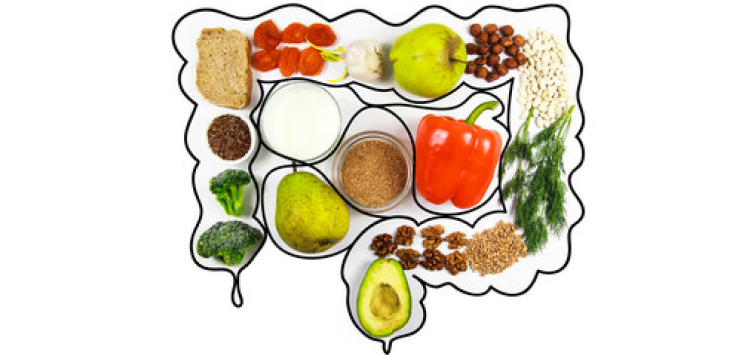Blog
Expert insights for your well-being journey. Your health is our priority.
Exploring That Ayurvedic Microbiome Connection: Optimizing Digestion and Health
“Quite literally, your gut is the epicenter of your mental and physical health. If you want better immunity, efficient digestion, improved clarity, and balance, focus on rebuilding your gut health.”

A recent study shows that two-thirds of adults experience ongoing digestive issues like gas, bloating, and stomach pain{1}. However, surprisingly few people actually see a doctor about these problems.
This statistic paints a clear picture: gut health issues are on the rise, yet remain largely unaddressed. Thankfully, ancient wisdom offers an Ayurvedic treatment for gut health. Ayurveda, the traditional Indian system of medicine, has emphasized the importance of digestive health for centuries. Ayurveda views the gut as the foundation of our well-being, and modern science is increasingly validating this approach. While the term “microbiome” might be new, the knowledge of nurturing a healthy gut ecosystem within us is as old as time itself.
The Microbiome: A Modern Marvel with Ancient Roots
Imagine a bustling ecosystem within you, teeming with trillions of bacteria, viruses, and fungi – that’s your gut microbiome! These microscopic residents play a crucial role in digestion, nutrient absorption, immune function, and even mental well-being.
There are two main types of gut bacteria: beneficial and harmful. The ideal scenario is a balanced microbiome where the good guys outnumber the bad. Interestingly, research suggests an intriguing link between gut health and mental well-being. Studies have shown a connection between an imbalanced gut microbiome and conditions like anxiety and depression.
The Ayurvedic Perspective: Gut Health is the Root of All Well-being
The ancient Indian system of medicine has emphasized the importance of gut health and Ayurveda for centuries. The concept of “Agni,” or digestive fire, is considered the cornerstone of a balanced gut in Ayurveda. Strong agni ensures efficient digestion and prevents the accumulation of toxins (ama) that can disrupt gut health.
Furthermore, Ayurveda recognizes the influence of our unique doshas (vata, pitta, kapha) on gut health and digestion. Understanding your dosha can help you tailor your diet and lifestyle practices to optimize your gut microbiome. Following an Ayurvedic diet for gut health can show impeccable results.
Discover Microbiome Harmony: Ayurvedic Practices for a Happy Gut
Ayurveda offers a treasure trove of practical ways to nurture your gut microbiome:

Eat with the Seasons
“Rtucaryacha,” the practice of Ayurvedic seasonal eating, encourages consuming fresh, local produce that aligns with the current season. This ensures optimal digestion and supports the natural rhythms of your body.
Spice Up Your Life
Ayurvedic spices like turmeric and cumin are not just culinary delights; they boast gut-friendly properties. Turmeric possesses powerful anti-inflammatory effects, while cumin aids digestion and helps to reduce bloating.
Nourish with Prebiotics
Fermented foods like yogurt and kefir are brimming with prebiotics, the food source for beneficial gut bacteria. Incorporating these into your diet can help maintain a healthy microbiome balance.
Silence the Stress
Chronic stress can wreak havoc on your gut health. Ayurvedic practices like yoga and meditation offer powerful tools for stress management, promoting a calmer gut environment.
Beyond the Plate: Ayurvedic Rituals for a Balanced Microbiome
Simple daily rituals can further support your Ayurvedic gut health journey.
- Start Your Day Right: Ayurveda recommends beginning your day with warm water and lemon. This gentle digestive stimulant helps to flush toxins and kickstart your digestive fire.
- Digest with Ease: Following meals, avoid strenuous activity. Opt for a gentle walk or sit upright to aid digestion and prevent discomfort.
- Find Your Inner Calm: Meditation and pranayama (yogic breathing techniques) promote relaxation and stress reduction, both of which contribute to a healthy gut.
The Modern-Ayurvedic Connection: A Symbiotic Approach
Modern scientific research continues to validate many Ayurvedic practices related to gut health. Studies have shown the potential benefits of specific Ayurvedic herbs like Triphala (a blend of three fruits) and Amalaki (Indian gooseberry) for gut support. However, it is recommended to always consult a qualified Ayurvedic practitioner before incorporating these into your routine.
Conclusion
Ayurveda offers a profound understanding of gut health and provides practical tools for cultivating a happy gut microbiome. By exploring Ayurvedic practices alongside modern knowledge, you can unlock a holistic approach to well-being that starts from within. Remember, a qualified Ayurvedic practitioner can guide you in creating a personalized plan to optimize your gut health and overall well-being.
Statistics Reference –